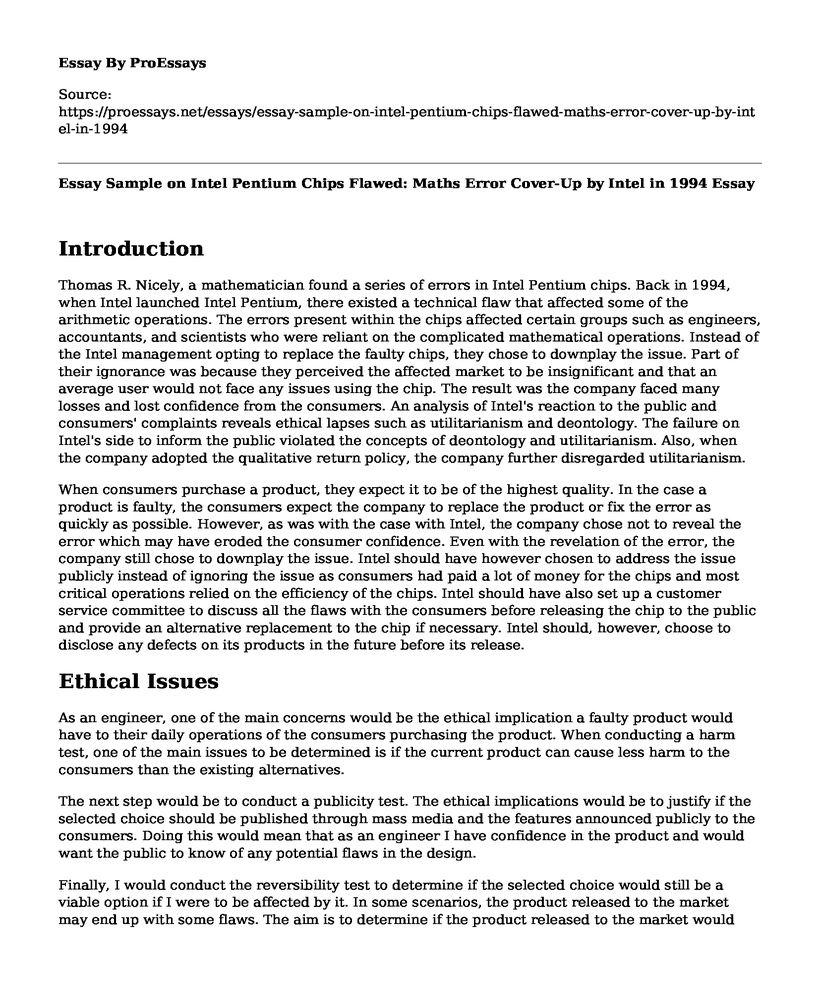Introduction
Thomas R. Nicely, a mathematician found a series of errors in Intel Pentium chips. Back in 1994, when Intel launched Intel Pentium, there existed a technical flaw that affected some of the arithmetic operations. The errors present within the chips affected certain groups such as engineers, accountants, and scientists who were reliant on the complicated mathematical operations. Instead of the Intel management opting to replace the faulty chips, they chose to downplay the issue. Part of their ignorance was because they perceived the affected market to be insignificant and that an average user would not face any issues using the chip. The result was the company faced many losses and lost confidence from the consumers. An analysis of Intel's reaction to the public and consumers' complaints reveals ethical lapses such as utilitarianism and deontology. The failure on Intel's side to inform the public violated the concepts of deontology and utilitarianism. Also, when the company adopted the qualitative return policy, the company further disregarded utilitarianism.
When consumers purchase a product, they expect it to be of the highest quality. In the case a product is faulty, the consumers expect the company to replace the product or fix the error as quickly as possible. However, as was with the case with Intel, the company chose not to reveal the error which may have eroded the consumer confidence. Even with the revelation of the error, the company still chose to downplay the issue. Intel should have however chosen to address the issue publicly instead of ignoring the issue as consumers had paid a lot of money for the chips and most critical operations relied on the efficiency of the chips. Intel should have also set up a customer service committee to discuss all the flaws with the consumers before releasing the chip to the public and provide an alternative replacement to the chip if necessary. Intel should, however, choose to disclose any defects on its products in the future before its release.
Ethical Issues
As an engineer, one of the main concerns would be the ethical implication a faulty product would have to their daily operations of the consumers purchasing the product. When conducting a harm test, one of the main issues to be determined is if the current product can cause less harm to the consumers than the existing alternatives.
The next step would be to conduct a publicity test. The ethical implications would be to justify if the selected choice should be published through mass media and the features announced publicly to the consumers. Doing this would mean that as an engineer I have confidence in the product and would want the public to know of any potential flaws in the design.
Finally, I would conduct the reversibility test to determine if the selected choice would still be a viable option if I were to be affected by it. In some scenarios, the product released to the market may end up with some flaws. The aim is to determine if the product released to the market would have a positive or negative consequence if it were determined to have a flaw.
Conclusion
Intel Pentium chip crisis presented one of the biggest ethical crisis in production history. Intel released a flawed chip that had dire consequences in critical daily operations. However, instead of acknowledging the flaw, the company chose to keep it a secret. Upon the revelation to the public that the chip was flawed, the company faced losses and negative perception from the consumers. However, to mitigate some of the ethical issues, the Intel board should reflect on utilitarianism and deontology. The company should also create a customer satisfaction division to deal with consumer concerns in the future and also have a faster process to replace faulty products.
Cite this page
Essay Sample on Intel Pentium Chips Flawed: Maths Error Cover-Up by Intel in 1994. (2023, Feb 12). Retrieved from https://proessays.net/essays/essay-sample-on-intel-pentium-chips-flawed-maths-error-cover-up-by-intel-in-1994
If you are the original author of this essay and no longer wish to have it published on the ProEssays website, please click below to request its removal:
- Paper Example on Business Strategy and its Purposes
- The Perils and Pitfalls of Leading Change Situation Analysis Paper Example
- Technology Project Implementation: Risks & Responses
- Leadership Styles of Sheikh Zayed & Sir Richard Branson - Essay Sample
- Paper Example on Aligning Projects, Processes and Information Requirements for Success
- Making Decisions with Data: Understanding Hypothesis Testing & Statistical Significance - Article Review Example
- Essay Sample on Privacy Policy: Understanding How Your Data is Protected







